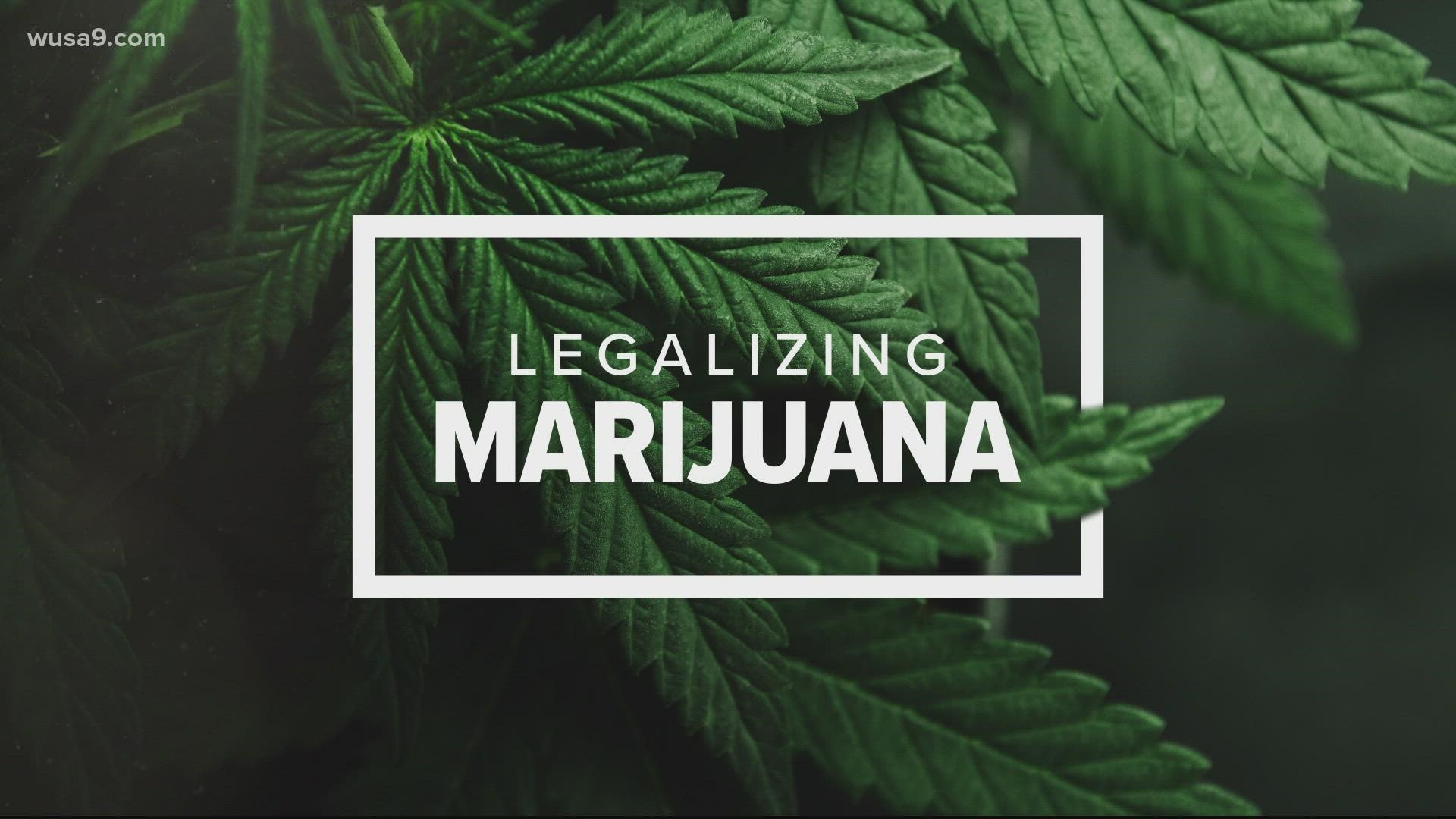WASHINGTON — Dozens of people participated in a marathon DC Council hearing Friday that could dramatically shape the future of marijuana laws in the District.
DC Council Chairman Phil Mendelson and DC Councilmembers Charles Allen and Kenyan McDuffie listened to the public’s thoughts on two cannabis related bills in a virtual meeting.
One bill would eliminate the requirement that forces medicinal marijuana patients to register with a specific dispensary in the District. The legislation would also set up safe use treatment facilities and allow delivery and curbside pickup services by dispensaries.
The other bill would legalize and regulate the sale of recreational marijuana in D.C.
Currently, D.C. residents can possess up to two ounces of marijuana for recreational use. However, they cannot sell the substance, per the Initiative 71 guidelines that were voted into law by District voters in 2014.
Lawmakers on Capitol Hill have the power to effectively block recreational marijuana sales in the District.
But this legislation comes after Congressional Republicans recently decided not to oppose D.C.’s efforts to tax recreational marijuana as they have in the past. That effort has usually been taken up in the form of the “Harris Rider,” which has appeared as language in annual appropriations bills.
Friday’s hearing started at 9 a.m. and lasted just short of nine hours. At the beginning of the hearing, Mendelson said 107 people were scheduled to speak.
Many speakers focused their thoughts on the need for socioeconomic and racial equity in any taxable marijuana market that D.C. sets up in the future.
“At the heart of today’s discussion is also understanding the difference between opportunity and inclusion and in what ways our legislation needs to be intentional in order to achieve that,” Allen said.
Mendelson said the bill would establish a robust social equity program and entrepreneurial opportunities for the individuals who have been the most impacted by the war on drugs.
“At least half of all cannabis business licenses would be set aside for Social Equity Applicants, defined as residents who have been previously convicted of cannabis related offenses,” he said.
Qualifying Social Equity applicants can also have lived 10 of the last 20 years in areas of high rates of poverty, unemployment, and cannabis-related arrests.
The bill also considers people who have been arrested on cannabis-related charges in the past. It would automatically expunge cannabis-related offenses off records and give people in jail a chance to have their sentences modified or vacated.
“This legislation would definitely boost public health and public safety in DC and begin to repair the past harms cannabis prohibition has caused, particularly in communities of color,” said Marijuana Policy Project legislative analyst Olivia Naugle.
However, some speakers, like We ACT Radio Co-Founder Kymone Freeman, say they want to ensure the District leaders do not eradicate many black-owned businesses that were set up as a result of Initiative 71.
“I’m here to advocate for a moratorium on any enforcement against the gifting stores and allowing them an opportunity to benefit from this market,” he said.
Blogger Joe Tierney, of The Gentleman Toker, echoed that sentiment.
“Initiative 71 represents more than legal weed,” he said. “It is a rekindling of the American dream and the entrepreneurial spirit of its citizens.”
Other speakers also demanded leaders lower the barriers of entry into any commercial marijuana market set up in D.C.
“The bill should also prioritize a number of very small-to-low entry barrier license types that are available only to social equity applicants, such as cottage cultivator permits, that would allow individuals to grow a very small amount of plants and commercially sell the cannabis sold to manufacturers or dispensaries,” said Queen Adesuyi, senior national policy manager of Drug Policy Alliance.
DC Marijuana Justice Co-Founder Adam Eidinger has a similar opinion.
"Let's embrace the already established cottage industry around homegrown cannabis by offering licenses at fair prices and no limit of the number of these cottage industry licenses available,” he said.
The bill that would establish a commercial market for recreational marijuana in D.C. has not been scheduled for a vote yet.
Mendelson’s spokesperson says the DC Council wants to first make sure Congress does not suddenly put a new measure in the federal appropriations bill that could block DC from going any farther with its legislation.
DC Delegate Eleanor Holmes Norton said in a recent statement she will continue to fight any efforts to place additional riders prohibiting DC legislation in the appropriations bill.
“Eighteen states have legalized recreational marijuana, and all have or will commercialize it,” Norton said. “D.C. should be able to collect tax revenue from all available sources, like every other jurisdiction, including from recreational marijuana, which is believed to be widely used in the District and throughout the country.”

